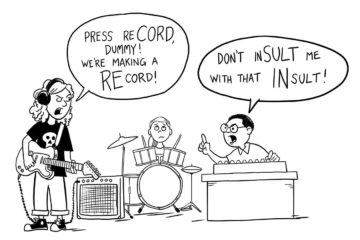Henry Hitchings in The Wall Street Journal:
 My daughter recently remarked, over breakfast in a cafe, that the customers, rather than the serving staff, should be known as waiters. Then she removed the mantle of cheese from my side order of hash browns and pointed out that these too were poorly named, since they were actually a shade of yellow. She is 3 years old—and though the assertive mode mostly trumps the interrogative, lately she has started asking tough questions about the English language.
My daughter recently remarked, over breakfast in a cafe, that the customers, rather than the serving staff, should be known as waiters. Then she removed the mantle of cheese from my side order of hash browns and pointed out that these too were poorly named, since they were actually a shade of yellow. She is 3 years old—and though the assertive mode mostly trumps the interrogative, lately she has started asking tough questions about the English language.
If the plural of “mouse” is “mice,” shouldn’t we refer to our neighbors living in “hice”? Can we really make up a story, a face, a magic potion and lost time, and also make up after a quarrel? Soon she will want to know why “of,” unlike other words ending with an “f,” sounds as though it ends with a “v.” From there it will be a short leap to laughing at the “l” in “salmon” and wondering by what strange process, linguistic as well as gastronomic, we ended up with “molten lava cake, laden with melted chocolate.”
…In bite-size chapters, with pungent titles such as “Why Do Noses Run and Feet Smell?,” Ms. Okrent investigates more or less familiar questions: Is the letter “y” a vowel or a consonant? What does it mean to say that the exception “proves” the rule? Why does English have so many synonyms? She also ponders whether “I am woe” would be better than “woe is me”; what egging someone on has to do with eggs; and why we don’t tell a restaurant server, “I’m a large spender. Make it a big pizza.”
More here.
